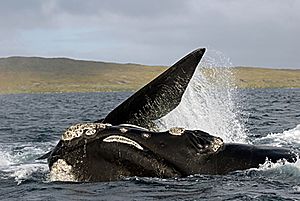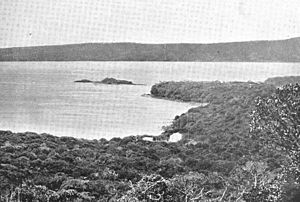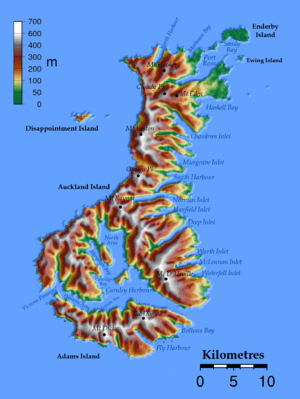Port Ross facts for kids

Port Ross is a natural harbour found on Auckland Island. This island is part of the Auckland Islands Group. This group is a chain of islands located in the subantarctic region. They are also part of the New Zealand Outlying Islands.
Contents
What is Port Ross?
Port Ross is a large, safe harbour. It is located on the northeastern side of Auckland Island. Several smaller islands guard its entrance. These include Rose Island, Enderby Island, Ewing Island, and tiny Ocean Island.
Why is Port Ross Important for Whales?
Port Ross is a very special place for southern right whales. It is the most important gathering spot for these whales in all of New Zealand's waters. Many whales come here to rest and have their calves.
A Look at Port Ross's History
Port Ross has a long and interesting history. Many different groups of people have visited or tried to live here over the years.
Early Settlements and Challenges
In 1842, some Ngāti Mutunga Māori people arrived at Port Ross. They came from the Chatham Islands. They also brought Moriori people with them. The Māori hoped to start a new settlement here.
A few years later, in the late 1840s, another group tried to settle. They wanted to farm and hunt whales. They built a small community called Hardwicke in Erebus Cove, inside the harbour. But the weather was very harsh. The settlement was abandoned after only three years. A cemetery from this time still remains. It was later used to bury people who died in shipwrecks.
Shipwrecks and Rescues
Port Ross has seen many shipwrecks. In 1866, the ship General Grant was wrecked. The survivors set up a camp in the harbour. They lived there for 18 months before they were rescued.
To help future shipwreck survivors, special castaway depots were built in Port Ross. These depots stored food, clothes, and tools. They were meant to help any sailors who got stranded on the islands. In 1887, a depot helped the survivors of the Derry Castle shipwreck.
Port Ross During World War II
During World War II, Port Ross was important for New Zealand's defense. It became one of three sites for the Cape Expedition. These were secret coastwatching stations. Their job was to watch for enemy ships. They were set up on New Zealand's subantarctic islands.
 | Madam C. J. Walker |
 | Janet Emerson Bashen |
 | Annie Turnbo Malone |
 | Maggie L. Walker |



